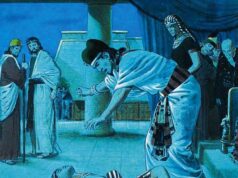By Pr Isaiah White
Apostle Paul, in his introduction to what the true Gospel is, said: “For I am not ashamed of the Gospel of Christ: for it is the power of God unto salvation to everyone that believeth; to the Jew first, and also to the Greek.
“For therein is the righteousness of God revealed from faith to faith: as it is written: ‘The just shall live by faith’.
“For the wrath of God is revealed from Heaven against all ungodliness and unrighteousness of men, who hold the truth in unrighteousness; Because that which may be known of God is manifest in them; for God hath shewed it unto them” (Romans 1:16-19).

There are three key elements in what Apostle Paul said:
The Gospel is power
There are different kinds of power at work in the world today.
Knowing which of them you are subjected to is crucial. Jesus warned that people get lost for two reasons.
The first being not understanding the Scriptures, and the second; not understanding God’s power (Matthew 22:29; Mark 12:24).
Knowing that the Gospel is the power of God, we should ask ourselves: how well do we understand God’s power?
Can we distinguish it from other powers in the world? These are important questions for Christians.
The Greek word translated as power in Romans 1:16 is “Dunamis” (transliteration), and appears in the New Testament over 120 times.
The term can be best translated as enabling power. Dunamis is the power that enables. It is the power outside us and exclusive with God.

It is the power that made possible God’s incarnation (Luke 1:35). Dunamis is not a magic power like that the sorcerers used in Egypt to perform the same miracles that Moses did (Exodus 7-8), nor is it the same power as Simon, the sorcerer used in Acts (Acts 8:9-24).
There are some so-called pastors and prophets today who use magic and dark powers on their unsuspecting followers, yet claim it is the power of God.
The unsuspecting audience never questions whether their leader’s power is the power of the true Gospel or not.
The Gospel, as the power of God, is not a power that performs magic, but rather a miraculous one that transforms lives morally and spiritually. It does not bring material transformation to anyone.
Dunamis is the Gospel power that enables us to escape the devil’s deception, and all sorts of false belief systems. It is the power of our salvation.
God’s power is in the availability of the Holy Spirit. Wherever the Spirit of God is absent, there is no power of God, and no Gospel.
“But you shall receive power when the Holy Spirit has come upon you; and you shall be my witnesses in Jerusalem and all Judea and Samaria and to the ends – the very bounds – of the Earth” (Acts 1:8).
The Holy Spirit is God Himself. It is not just a force we invoke against situations and other natural or supernatural agents.
The true Gospel is God’s power for the salvation of nations. This is not for physical healing miracles, magic, financial or other material gains, but for the salvation of lost souls.
God’s righteousness
The true Gospel is not about men’s righteousness or religion, but God’s righteousness. It reminds the world that it is not our righteousness that saves us, but God’s righteousness.
The righteousness of God Paul refers to is the righteousness that comes from God, which He gives to those who believe. The Old Testament, which forms the main background of Paul’s thought and language, presents righteousness not so much as a moral quality but rather one’s standing with God.
Since all have fallen away from God (Romans 3:23), we can only be put back into right standing with God by divine uncompromised righteousness.
Sinners are not justified by their own righteousness by keeping the Law (Galatians 3:11), but rather by God imputing Christ’s righteousness to them by faith.
Paul states this plainly in Philippians 3, where he contrasts his former attempts to be righteous by keeping the law with his present experience with Christ.
In Philippians 3:9 he says: “Not having a righteousness of my own derived from the law, but that which is through faith in Christ, the righteousness which comes from God on the basis of faith in Jesus Christ.”
Salvation upholds God’s righteousness by applying it to the sinner who believes.
Against ungoldliness
The Gospel addresses ungodliness and unrighteousness. This is not a matter of immorality or illegality. The Gospel has a value system that transcends the norms and laws that have been imposed by culture and law.
It knows there are matters culturally accepted and constitutionally allowed, but are ungodly and unrighteous before God.
No matter what your culture, religion, country and whatever society you belong to accepts or condones, the Gospel concerns itself with the Will of God above all other positions.
Deceptive Gospel
The modern day Gospel, commonly known as the “prosperity Gospel” is preaching and teaching about wealth, health, and successful marriages, among others.
This is heresy and dangerous for blind believers. To build faith on the acquisition of material wealth is not divine, but demonic.
Like Charles Spurgeon noted: “I believe that it is anti-Christian and unholy for any Christian to live with the object of accumulation of wealth. Are we not supposed to strive all we can to get all the money we can? You may be right.
“I cannot doubt, but that, in so doing, you may serve God. But what I argued was that living with the object of wealth is anti-Christian.”
Dr Edward Tamale Sali, the founder of Faith and Science Ministries also says: “The Gospel of miracles that do not teach living righteously before God is fake and Ugandans call it Bufere.
“Christians who see this or to whom it is revealed should run away from such organizations or fellowships.”
The God of the Bible is a miracle-performing God. He has done wonders since creation. However, miracles are not a foundation or pillar of our faith in God.
The Bible reminds us that signs and wonders are a sign to non-believers (Matthew 12:29; 1 Corinthians 14:22).

Church merchandise
The New Testament records this event: “And Jesus went into the temple of God, and cast out all them that sold and bought in the temple, and overthrew the tables of the money changers, and the seats of them that sold doves, and said unto them, it is written, my house shall be called the house of prayer; but ye have made it a den of thieves” (Matthew 21:12-13).
Like the early Church, this generation has compromised the Gospel in many ways. Churches and religions have become local and global enterprises.
The Church is a marketplace where commodities like holy oil, holy handkerchiefs and scarves, books, decorated hoodies, T-shirts, among other goods are marketed and sold.
The Church has turned into a commercial centre where transactions are conducted between pastors and worshipers.
Preachers ask followers to sow financial seeds so they can get financial blessings.
This is not the true Gospel. Others preach and encourage followers to pray for miracle money (money deposited on your account outside the known earning procedures).
This is against the divine order of working to earn (Genesis 3:19, Genesis 8:22, Deuteronomy 16:15).
No compromise
The story of the three Hebrew boys in Babylon (Daniel 3) who refused to worship idols, reminds us of the importance of not compromising the Word of God.
Not even when the authorities are against us. In Uganda, religious people commemorate on June 3 every year, martyrs who were killed for rebelling against the authorities of their time that required them to compromise their faith.
In some Churches today, sermons are tuned to the interests of the authorities and the prophetic voice that rebukes evil in high places has been silenced.
In others, rich sinful members are not rebuked and neither is their sin condemned due to fear that they may withdraw from the Church their fat cheques.
The Gospel has one object of worship; the one true God, not celebrity religious leaders we worship. Only God is holy and worthy of our worship.
The Gospel points us to Himself as our Creator and Redeemer. The true Gospel reminds us that the one true God who created us is the only God who can, will and has saved us.

The Gospel and rituals
Judaism in the Old Testament lists rituals for Israel’s worship of God. There were many ceremonial laws for them to observe. Some of those laws were very specific and involved the sprinkling of water, blood, grain waving or clothes washing.
Others were about special worship days. The New Testament, however, teaches us that all these were fulfilled in Christ (Matthew 5:17).
The Old Testament rituals were never intended to be a permanent part of worship, as Scripture clearly teaches.
The only rites Church must observe are the ordinances: baptism by immersion (Matthew 28:19) and communion (1 Corinthians 11:25).
It is absurd that many Churches today still hold rituals such as compulsory fasting, baths, washing, and other obscene rituals that in some incidences have led to deaths.
We are reminded to pray without ceasing (1 Thessalonians 5:16-18), but we should not turn prayer into a ritual.
Fasting is a Christian practice, but it should never be treated as an exclusive ritual that without it, God cannot answer our prayers (Matthew 17:21).





















